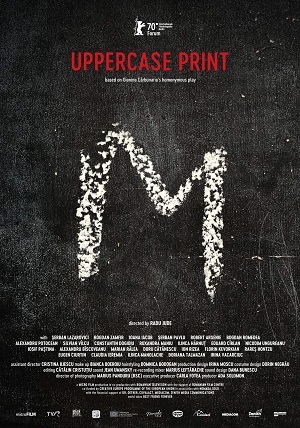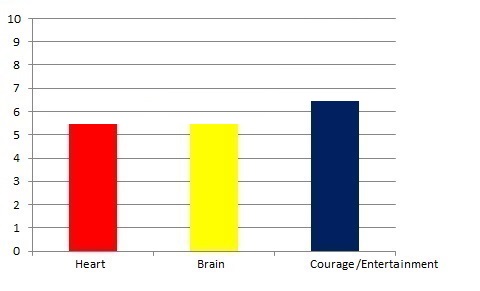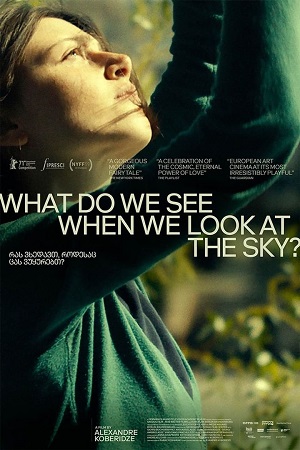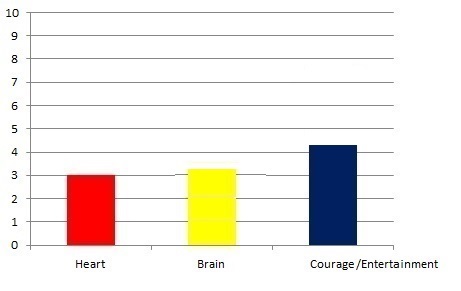
Alphabetical Menu
Chronological Menu

Uppercase Print is not an easy to categorize because director Radu Jude combines documentary footage and a filmed play to shed light on a part of Romanian history. Back in 1981 when Nicolae Ceausescu led communist Romania, the Secret Police investigated a series of messages written in chalk in uppercase letters on the walls in the city of Botosani. The messages were in protest of the communist regime. Jude focuses on how the Secret Police's investigation led to the arrest of the culprit, Mugur Calinescu, who was just 16-years old at the time, and how Mugur's friends turned against him. Serban Lazarovici plays Mugur in a rather emotionally muted, monotonous, and deadpan performance while breaking the 4th wall by looking at the audience. Other actors, like those who play his parents, do the same. What follows is a rather dry, bland and even somewhat lethargic experience despite that its subject matter sounds both intriguing and suspenseful. The documentary/play hybrid format does manage to be a refreshing and unconventional way of telling Calinescu's story, so Jude deserves to be commended for taking those risks, but the way that it's executed falls flat, especially on an emotional level. A truly great documentary should find the right balance between entertaining the audience and provoking them emotionally as well as intellectually. Uppercase Print begins promisingly with an amusing clip showing the consequences of the incompetence of a teleprompter, but after that the film never matches the momentum of those first few opening minutes, and ultimately fails to find that much-needed balance. At an overlong running time of 2 hours and 8 minutes, Uppercase Print is refreshingly unconventional, but often dull and underwhelming. It opens at Metrograph via Big World Pictures. 
Julia is a conventional documentary biopic about famous icon Julia Child that nonetheless hits all the right notes: it's enormously entertaining, insightful and even moving at times. There's nothing inherently wrong with a conventional approach as long as it appeals to the heart and mind without becoming dull. Co-directors Julie Cohen and Betsy West do a great job of showing what Julia Child was both as a chef and as a human being. This isn't a hagiographic documentary; it also delves into her struggles and obstacles that she faced in her work life as well as her in personal life while also providing a glimpse of what her personality was like. They begin the doc with succulent, delicious-looking shots of food and there are plenty of clips of Julia cooking on her show after that, so don't watch the film while you're hungry. Combining interviews with her friends and colleagues, photographs from her childhood, and footage from her shows, Julia remains thoroughly captivating and with brisk pacing. It avoids feeling dry or repetitive, but the filmmakers are lucky to have such an interesting, warm and charismatic subject. Even those of you who are familiar with Julia Child will learn something new about her; everyone, though, will see her as a human being by the time the end credits roll and to understand what makes her such an inspirational role model for other chefs as well as her viewers. Although Julia doesn't quite reach the emotional heights of RGB, it's still a captivating, illuminating and well-edited delight that captures Julia Child's warmth, wisdom and humanity. At a running time 1 hour and 35 minutes, Julia opens at Angelika Film Center and AMC Lincoln Square via Sony Pictures Classics. Belfast  In 1960s Belfast, Buddy (Jude Hill) lives with his mom (Caitríona Balfe) and dad (Jamie Dornan) near the home of his grandma (Judi Dench) and grandpa (Ciarán Hinds). He has a crush on a classmate and tries to improve his math skills to impress her. His father struggles to make ends meet and owes a lot of money in back taxes, so he finds a job that means less time spent with his family. Meanwhile, a war known as the Troubles goes on between the Protestants and the Catholics. Writer/director Kenneth Branagh shies away from allowing the story to get too dark or emotionally unflinching as though this were a family-friendly Disney movie. There are more than a few subplots, but the characters' struggles are never explored profoundly enough. It's not surprising that Buddy's mother, father, grandma and grandpa have no names because their characters aren't fleshed out much. His grandma and grandpa are essentially just one note: pleasant. Even the relationship between Buddy's mom and dad seems sugar-coated and not underdeveloped. As Hitchcock once observed, some movies are a slice-of-cake while others are slice-of-life. There's so much potential for Belfast to be a powerful slice-of-life, but instead it's more like a slice-of-cake. Branagh tries too hard to uplift the audience and doesn't trust their emotions enough. There are too few intimate moments where you can truly get to know the heart, mind and soul of any of the characters. If the film were to slow down and humanize its characters instead, perhaps it would've been more engrossing. Belfast also suffers from a lack of dramatic momentum which sometimes can work for the film's benefit, but not in this case. In Boyhood, for instance, Richard Linklater omits a lot of dramatic scenes in Boyhood while leaving a lot to the audience's imagination, but it ends up being a very moving, wise and honest slice-of-life. The same can't be said about Belfast. Branagh barely scratches the surface of the harsh realities of the Troubles. He does show the riots briefly, though, so at least there's a little of that much-needed depth and darker element. Too much of the film feels either contrived or corny. Branagh also relies too heavily on the soundtrack to appeal to the audience's emotions. There's a scene later where Buddy lip-syncs a song to his wife, but even though the song is a beautiful one, it just seems like it's tacked on and, yet again, trying too hard to please the audience. Branagh bookends the film with color cinematography while the flashbacks to 1960s Belfast are in glorious black-and-white, except for the clips from the film Chitty Chitty Bang Bang that Buddy and his family watch at the local theater. The camerawork and cinematography add plenty of style. It's unfortunate, then, that Belfast ultimately lacks substance. The pace moves a little too quickly at times, especially during the third act that feels rushed. Jude Hill gives a decent performance as do everyone else, but they're undermined by the shallow screenplay. At a surprisingly brief running time of 97 minutes, Belfast is beautifully-shot with a great soundtrack, but saccharine and contrived while failing to pack an emotional punch.  What Do We See When We Look at the Sky? 
 |